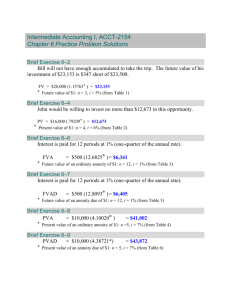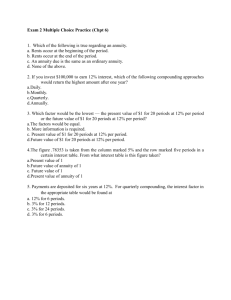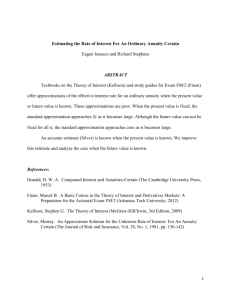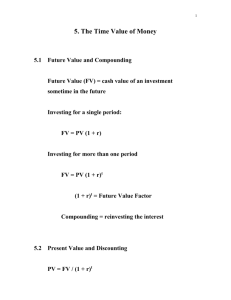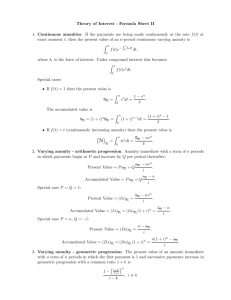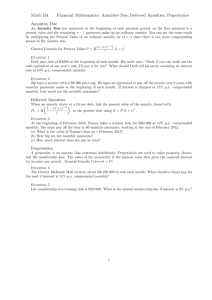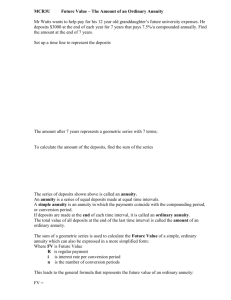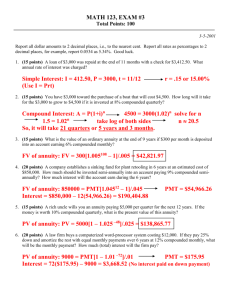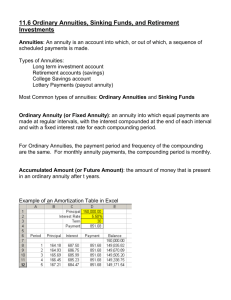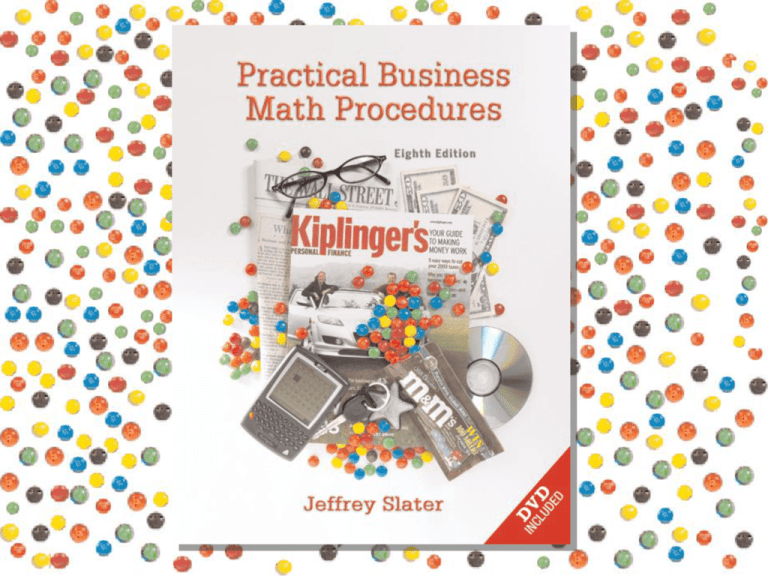
13-1
Chapter 13
Annuities and
Sinking Funds
13-2 McGraw-Hill/Irwin
Copyright © 2006 by The McGraw-Hill Companies, Inc. All rights reserved.
#13
Annuities and Sinking Funds
Learning Unit Objectives
LU13.1
Annuities: Ordinary Annuity and
Annuity Due (Find Future Value)
• Differentiate between contingent
annuities and annuities certain
• Calculate the future value of an
ordinary annuity and an annuity
due manually and by table lookup
13-3
#13
Annuities and Sinking Funds
Learning Unit Objectives
LU13.2
Present Value of an Ordinary Annuity
(Find Present Value)
• Calculate the present value of an ordinary
annuity by table lookup and manually
check the calculation
• Compare the calculation of the present
value of one lump sum versus the present
value of an ordinary annuity
13-4
#13
Annuities and Sinking Funds
Learning Unit Objectives
LU13.3
Sinking Funds (Find Periodic Payments
• Calculate the payment made at the end
of each period by table lookup
• Check table lookup by using ordinary
annuity table
13-5
Compounding Interest (Future Value)
Annuity - A series of
payments
Future value of annuity the future dollar amount of
a series of payments plus
interest
13-6
Term of the annuity - the
time from the beginning of
the first payment period to
the end of the last payment
period.
Present value of an annuity - the
amount of money needed to
invest today in order to receive a
stream of payments for a given
number of years in the future
Figure 13.1 Future value of an
annuity of $1 at 8%
$3.25
$3.50
$3.00
$2.50
$2.08
$2.00
$1.50
$1.00
$1.00
$0.50
$0.00
1
2
End of period
13-7
3
Classification of Annuities
13-8
Contingent Annuities have no fixed number of
payments but depend on
an uncertain event
Annuities certain - have a
specific stated number of
payments
Life Insurance payments
Mortgage payments
Classification of Annuities
Annuity due regular
deposits/payments
made at the
beginning of the
period
Ordinary annuity regular
deposits/payments
made at the end of
the period
13-9
Jan. 31
Monthly
Jan. 1
March 30
Quarterly
Jan. 1
June 30
Semiannually
Jan. 1
Dec. 31
Annually
Jan. 1
Tools for Calculating Compound Interest
Number of periods (N)
Number of years times
the number of times the
interest is compounded
per year
Rate for each period (R)
Annual interest rate
divided by the number of
times the interest is
compounded per year
If you compounded $100 each year for 3 years at 6%
annually, semiannually, or quarterly What is N and R?
Periods
Rate
Annually:
6% / 1 = 6%
Annually:
3x1=3
Semiannually: 6% / 2 = 3%
Semiannually: 3 x 2 = 6
Quarterly: 6% / 4 = 1.5%
Quarterly: 3 x 4 = 12
13-10
Calculating Future Value of an Ordinary
Annuity Manually
Step 4. Repeat steps 2 and 3 until the end
of the desired period is reached.
Step 3. Add the additional investment at the
end of period 2 to the new balance.
Step 2. For period 2, calculate interest
on the balance and add the interest to
the previous balance.
Step 1. For period 1, no interest calculation is
necessary, since money is invested at the end of
period
13-11
Calculating Future Value of an Ordinary
Annuity Manually
Find the value of an
investment after 5
years for a $2,000
ordinary annuity at
9%
13-12
Manual Calculation
$ 2,000.00 End of Yr 1
180.00
2,180.00
2,000.00 End of Yr 2
4,180.00
376.20
4,556.20
2,000.00 End of Yr 3
6,556.20
590.06
7,146.26
2,000.00 End of Yr 4
9,146.26
823.16
9,969.42
2,000.00 End of Yr 5
$ 11,969.42
Calculating Future Value of an Ordinary
Annuity by Table Lookup
Step 3. Multiply the payment each period
by the table factor. This gives the future
value of the annuity.
Future value of = Annuity pymt. x Ordinary annuity
ordinary annuity each period
table factor
Step 2. Lookup the periods and rate in
an ordinary annuity table. The
intersection gives the table factor for the
future value of $1
Step 1. Calculate the number of periods and
rate per period
13-13
Table 13.1 Ordinary annuity table:
Compound sum of an annuity of $1
Ordinary annuity table: Compound sum of an annuity of $1 (Partial)
13-14
Period
2%
3%
4%
5%
6%
7%
8%
9%
10%
1
1.0000
1.0000
1.0000
1.0000
1.0000
1.0000
1.0000
1.0000
1.0000
2
2.0200
2.0300
2.0400
2.0500
2.0600
2.0700
2.0800
2.0900
2.1000
3
3.0604
3.0909
3.1216
3.1525
3.1836
3.2149
3.2464
1.0000
3.3100
4
4.1216
4.1836
4.2465
4.3101
4.3746
4.4399
4.5061
4.5731
4.6410
5
5.2040
5.3091
5.4163
5.5256
5.6371
5.7507
5.8666
5.9847
6.1051
6
6.3081
6.4684
6.6330
6.8019
6.9753
7.1533
7.3359
7.5233
7.7156
7
7.4343
7.6625
7.8983
8.1420
8.3938
8.6540
8.9228
9.2004
9.4872
8
8.5829
8.8923
9.2142
9.5491
9.8975
10.2598
10.6366
11.0285
11.4359
9
9.7546
10.1591
10.5828
11.0265
11.4913
11.9780
12.4876
13.0210
13.5795
10
10.9497
11.4639
12.0061
12.5779
13.1808
13.8164
14.4866
15.1929
15.9374
11
12.1687
12.8078
13.4863
14.2068
14.9716
15.7836
16.6455
17.5603
18.5312
12
13.4120
14.1920
15.0258
15.9171
16.8699
17.8884
18.9771
20.1407
21.3843
13
14.6803
15.6178
16.6268
17.7129
18.8821
20.1406
21.4953
22.9534
24.5227
14
15.9739
17.0863
18.2919
19.5986
21.0150
22.5505
24.2149
26.0192
27.9750
15
17.2934
18.5989
20.0236
21.5785
23.2759
25.1290
27.1521
29.3609
31.7725
Future Value of an Ordinary Annuity
Find the value of an
investment after 5
years for a $2,000
ordinary annuity at
9%
13-15
N=5x1=5
R = 9%/1 = 9%
5.9847 x $2,000
$11,969.40
Calculating Future Value of an
Annuity Due Manually
Step 3. Repeat steps 1 and 2 until the end
of the desired period is reached.
Step 2. Add additional investment at the
beginning of the period to the new
balance.
Step 1. Calculate the interest on the balance for the
period and add it to the previous balance
13-16
Calculating Future Value of
an Annuity Due Manually
Find the value of an
investment after 5
years for a $2,000
annuity due at 9%
13-17
Manual Calculation
$ 2,000.00 Beginning Yr 1
180.00
2,180.00
2,000.00 Beginning Yr 2
4,180.00
376.20
4,556.20
2,000.00 Beginning Yr 3
6,556.20
590.06
7,146.26
2,000.00 Beginning Yr 4
9,146.26
823.16
9,969.42
2,000.00 Beginning Yr 5
$ 11,969.42
1,077.25
$ 13,046.67 End of Yr. 5
Calculating Future Value of an
Annuity Due by Table Lookup
Step 4. Subtract 1 payment from
Step 3.
Step 3. Multiply the payment each period
by the table factor.
Step 2. Look up the periods and rate in an
ordinary annuity table. The intersection
gives the table factor for the future value
of $1
Step 1. Calculate the number of periods and rate
per period. Add one extra period.
13-18
Future Value of an Annuity Due
Find the value of an
investment after 5
years for a $2,000
annuity due at 9%
N=5x1=5+1=6
R = 9%/1 = 9%
7.5233 x $2,000
$15,046.60 - $2,000
$13,046.60
13-19
Figure 13.2 - Present value of
an annuity of $1 at 8%
$3.50
$3.00
$2.58
$2.50
$1.78
$2.00
$1.50
$.93
$1.00
$0.50
$0.00
1
2
End of period
13-20
3
Calculating Present Value of an Ordinary
Annuity by Table Lookup
Step 3. Multiply the withdrawal for each period
by the table factor. This gives the present value
of an ordinary annuity
Present value of = Annuity x Present value of
ordinary annuity pymt. Pymt. ordinary annuity table
Step 2. Look up the periods and rate in an
ordinary annuity table. The intersection
gives the table factor for the present value
of $1
Step 1. Calculate the number of periods and rate
per period
13-21
Table 13.2 - Present Value
of an Annuity of $1
Present value of an annuity of $1 (Partial)
13-22
Period
2%
3%
4%
5%
6%
7%
8%
9%
10%
1
0.9804
0.9709
0.9615
0.9524
0.9434
0.9346
0.9259
0.9174
0.9091
2
1.9416
1.9135
1.8861
1.8594
1.8334
1.8080
1.7833
1.7591
1.7355
3
2.8839
2.8286
2.7751
2.7232
2.6730
2.6243
2.5771
2.5313
2.4869
4
3.8077
3.7171
3.6299
3.5459
3.4651
3.3872
3.3121
3.2397
3.1699
5
4.7134
4.5797
4.4518
4.3295
4.2124
4.1002
3.9927
3.8897
3.7908
6
5.6014
5.4172
5.2421
5.0757
4.9173
4.7665
4.6229
4.4859
4.3553
7
6.4720
6.2303
6.0021
5.7864
5.5824
5.3893
5.2064
5.0330
4.8684
8
7.3255
7.0197
6.7327
6.4632
6.2098
5.9713
5.7466
5.5348
5.3349
9
8.1622
7.7861
7.4353
7.1078
6.8017
6.5152
6.2469
5.9952
5.7590
10
8.9826
8.5302
8.1109
7.7217
7.3601
7.0236
6.7101
6.4177
6.1446
11
9.7868
9.2526
8.7605
8.3064
7.8869
7.4987
7.1390
6.8052
6.4951
12
10.5753
9.9540
9.3851
8.8632
8.3838
7.9427
7.5361
7.1607
6.8137
13
11.3483
10.6350
9.9856
9.3936
8.8527
8.3576
7.9038
7.4869
7.1034
14
12.1062
11.2961
10.5631
9.8986
9.2950
8.7455
8.2442
7.7862
7.3667
15
12.8492
11.9379
11.1184
10.3796
9.7122
9.1079
8.5595
8.0607
7.6061
Present Value of an Annuity
Duncan Harris wants to receive a
$5,000 annuity in 5 years.
Interest on the annuity is 8%
semiannually. Duncan will make
withdrawals every six months.
How much must Duncan invest
today to receive a stream of
payments for 5 years.
Interest ==>
Payment ==>
Interest ==>
Payment ==>
Interest ==>
Payment ==>
N = 5 x 2 = 10
R = 8%/2 = 4%
Payment ==>
8.1109 x $5,000
Interest ==>
$40,554.50
13-23
Interest ==>
Payment ==>
End of Year 5 ==>
Manual Calculation
$
40,554.50
1,622.18
42,176.68
(5,000.00)
37,176.68
1,487.07
38,663.75
(5,000.00)
33,663.75
1,346.55
35,010.30
(5,000.00)
30,010.30
1,200.41
31,210.71
(5,000.00)
26,210.71
1,048.43
27,259.14
(5,000.00)
22,259.14
890.37
23,149.50
(5,000.00)
18,149.50
725.98
18,875.48
(5,000.00)
13,875.48
555.02
14,430.50
(5,000.00)
9,430.50
377.22
9,807.72
(5,000.00)
4,807.72
192.31
5,000.03
(5,000.00)
0.03
Lump Sums versus Annuities
Karen Jones made deposits of
$1,000 to Fleet Bank, which pays
6% interest compounded
annually. After 4 years, Karen
makes no more deposits. What
will be the balance in the account
10 years after the last deposit
Future value
of a lump
sum
N=4x1=4
R = 6%/1 = 6%
4.3746 x $1,000
$4,374.60
Step 1
13-24
Future
value of
an
annuity
N = 10 x 1 = 10
R = 6%/1 = 6%
1.7908 x $4,374.60
$7,834.03
Step 2
Sinking Funds (Find Periodic Payments)
Bonds
Bonds
Sinking Fund = Future
Payment
Value
13-25
x Sinking Fund
Table Factor
Table 13.3 - Sinking Fund Table
Based on $1
Sinking fund table based on $1 (Partial)
13-26
Period
2%
3%
4%
5%
6%
8%
10%
1
1.0000
1.0000
1.0000
1.0000
1.0000
1.0000
1.0000
2
0.4951
0.4926
0.4902
0.4878
0.4854
0.4808
0.4762
3
0.3268
0.3235
0.3203
0.3172
0.3141
0.3080
0.3021
4
0.2426
0.2390
0.2355
0.2320
0.2286
0.2219
0.2155
5
0.1922
0.1884
0.1846
0.1810
0.1774
0.1705
0.1638
6
0.1585
0.1546
0.1508
0.1470
0.1434
0.1363
0.1296
7
0.1345
0.1305
0.1266
0.1228
0.1191
0.1121
0.1054
8
0.1165
0.1125
0.1085
0.1047
0.1010
0.0940
0.0874
9
0.1025
0.0984
0.0945
0.0907
0.0870
0.0801
0.0736
10
0.0913
0.0872
0.0833
0.0795
0.0759
0.0690
0.0627
11
0.0822
0.0781
0.0741
0.0704
0.0668
0.0601
0.0540
12
0.0746
0.0705
0.0666
0.0628
0.0593
0.0527
0.0468
13
0.0681
0.0640
0.0601
0.0565
0.0530
0.0465
0.0408
14
0.0626
0.0585
0.0547
0.0510
0.0476
0.0413
0.0357
15
0.0578
0.0538
0.0499
0.0463
0.0430
0.0368
0.0315
Sinking Fund
To retire a bond issue, Randolph
Company needs $150,000 in 10 years.
The interest rate is 8% compounded
annually. What payment must
Randolph Co. make at the end of
each year to meet its obligation?
N = 10 x 1 = 10
R = 8%/1 = 8%
0.0690 x $150,000
$10,350
13-27
Check
$10,350 x 14.4866
149,936.30*
N = 10, R= 8%
Future Value
of an annuity
table
* Off due to rounding

